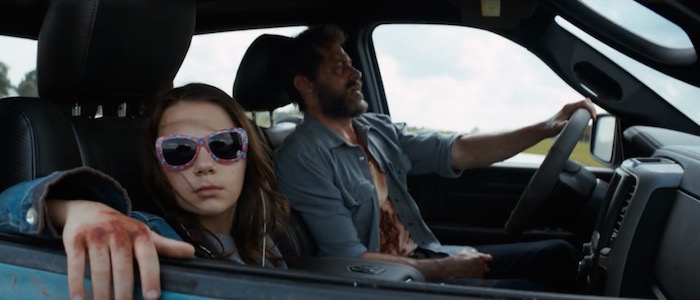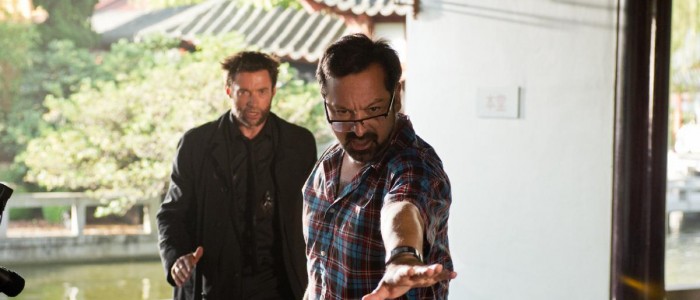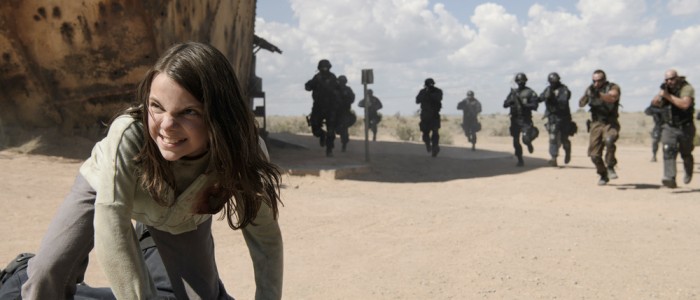Interview: 'Logan' Director James Mangold On His Influences, PG-13 Violence, And The Political Relevance Of The X-Men
Logan may technically be an X-Men spinoff, but it doesn't really feel like an X-Men movie — or really any superhero movie, for that matter. It's more akin to an offbeat road trip flick a la Little Miss Sunshine, filtered through a grimy Western vibe and undergirded by years of cinematic and comic book history. During a recent press day in New York, I had a chance to sit down with director James Mangold to talk about his unusual superhero movie. We discussed the many other films that influenced this one, the political relevance of the X-Men franchise, the consequences (or lack thereof) of movie violence, and your new favorite X-Men character, Laura.
Read our full James Mangold interview below.
Can you talk a little bit about which movies were your inspirations for this film? I know you've talked about Paper Moon, Bad News Bears, Little Miss Sunshine, and I know Shane is actually in the movie.
Yeah. Shane, obviously. The Gauntlet. The Cowboys. Many movies influenced this. I think more than anything was the idea at the center of all these influencing movies, how do I construct a film that confronts Logan with what he's most frightened of? And in a sense, that wasn't the biggest supervillain, and it isn't the destruction of the planet, or even the end of his own life, but love. Intimacy. So how do I put him in the most uncomfortable position by the end of the first act that I can? And the idea for me was to have him caring, reluctantly, for an ailing father, and suffering through a dead-end job, trying to buy his meds, trying to keep him from hurting anyone else when he has the world's most powerful brain, and Charles has a degenerative brain disease. But also being confronted with a daughter, and having to decide whether he's actually going to play a role in her life and protect her, and care for her. And of course, he does it as slowly and begrudgingly and stubbornly as humanly possible.
Yeah. I know Logan's had a lot of — he had Rogue going way back to the original X-Men, and in the comics there's Jubilee, so I know there's precedent for him having a sort of younger sister- or daughter-like figure.
But also, that he's never had to own responsibility for them. It's always been, he's just another member of the Charles Xavier campground, you know? Here, the roles are reversed and Logan's kind of the paternal leader of this group, and responsible for everyone's safety.
 Logan is set in the year 2029, which is close enough that we can kind of extrapolate but still far enough that you had to do some guesswork. What did you think about when you were trying to build the world of 2029? Did you do any research?
Logan is set in the year 2029, which is close enough that we can kind of extrapolate but still far enough that you had to do some guesswork. What did you think about when you were trying to build the world of 2029? Did you do any research?
Well, I think the main thing I did was try to think a little bit about just what the political realities and cultural realities of the moment were. Mainly, knowing immigration is such a hot button in the country at this moment, and thinking about that wall in the southwest that some candidates were promising. We were shooting during the presidential election, and thinking about how we could just kind of put these elements in the movie and use them in the same way [that] from the beginning, the X-Men series has used current cultural and sociological issues as kind of ways to explore what it is to be a mutant. And I thought putting mutants in the immigrant experience, on the run, trying to get across the border, being chased, would be really interesting for this film.
Logan also incorporates the idea of X-Men comics in a really interesting way. So first of all, how many of those comics are actual comics that exist, and then how many did you make up? And second, how did the idea come to you?
We had to make them all. Marvel only agreed to let me do this as long as we didn't use any real Marvel comics. So we made them all up. But they involved existing Marvel characters. But they just couldn't be real Marvel comics. You'd have to go ask Marvel why. But the reality was that once we did that, for me, the story idea was that all these comics exist. The whole library of Marvel comics, action figures, all of it exists. I never got into it, but I even assume maybe the movies exist. But the reality was that, like in Unforgiven, when [Clint] Eastwood runs into Richard Harris, who's writing these fictional accounts of the great Western heroes, or Pat Garrett in Billy the Kid, where you've got these aging heroes who kind of are twilight versions of their own legends — I think that idea, of being a kind of celebrity, or like a sports star long past your heyday, was really interesting for me to investigate with this kind of world.
How complete are the comics? Like is there somewhere an actual, basically an entire issue or something?
No, they're not complete. There's just the pages we needed.
Did you write them?
No, no, they were a collaboration. I couldn't say I wrote them, but Joe Quesada, who was a major writer and artist for Marvel for a long time, in fact ran Marvel for a long time, drew them and designed them and wrote them.
 Logan really plays like a movie where you didn't have to hold back at all. Was there anything that you still had to leave on the table, that you're disappointed you didn't get to do?
Logan really plays like a movie where you didn't have to hold back at all. Was there anything that you still had to leave on the table, that you're disappointed you didn't get to do?
No. I still — all my collaborators and I have had moments where we turn to each other and go, "I just can't believe I got away with this." But it's a credit to the studio. I mean, they were looking, they were just happy with the film. And whatever that alchemy was, whatever that thing was that made everyone see the same movie and work along the lines of the same movie, I haven't had a single tense moment with actors, studio, script writers, Marvel, Fox, anybody.
That's great. I know Caliban is a supporting character in this, but he actually has been in one of the other X-Men movies before. So was there any concern about continuity? Is it even intended to be the same person?
It was more of a slight little trainwreck, in the sense that I had written him into my film and then discovered they were also working on him in the other movie. And at that point, I was just like, "Ah, fuck it." I figured we were far enough in the future that our two versions could be some alternate versions of the same character. But Caliban plays such a small role in the last X-Men movie that I didn't really think it was worth being tied to the way they staged him, kind of as a cameo, to tie up what would be a principal character in our film.
And Marvel and Fox didn't have any concerns about that, or issues with that?
You'd be surprised. No.
 While we're on the topic of other X-Men movies, I have to ask: Do you know if there's any chance Dafne Keen would come back as Laura in any of the future films?
While we're on the topic of other X-Men movies, I have to ask: Do you know if there's any chance Dafne Keen would come back as Laura in any of the future films?
I mean, I know she wants to act. I know she was phenomenal in this movie. And I can't think of a reason there wouldn't be interest in the studio or otherwise. But no one's been working on anything yet.
I thought X-23 was really fantastic. And one of the things that struck me when I was watching her was that she's the kind of young female character that I wish I had had as a kid, despite the fact that Logan is an R-rated movie. I was wondering if you thought about that at all, what kids might think of her.
Yeah. Well, I did. It is the one area where it's difficult. But I also realize that movies like, for instance, Bad News Bears, let parents decide when their kid is ready. I think in many ways, it all depends on the kid, what a kid is ready to see and what a kid is not ready to see. But even though Dafne is eleven, she could be inspiring to the 20- and 25- and 30-year-olds of us. Because I think this is not a movie for kids. It isn't.
Logan is one of the most violent comic book movies we've seen in a while, but it's also a movie that kind of tries to reckon with the cost of violence. So how did you try to reconcile those two sides of portraying violence onscreen?
You couldn't have put it better than you just did in your question, which is that I wanted to go further with the violence, but I also wanted to feel the power and the gravity of the loss of human life. To me, that's more important. I mean, far more dangerous to me than seeing claws come through someone's skull, is the way that movies can mow people down in a PG-13 film, and just bodies are falling everywhere, and because it's a little less bloody, it somehow is okay. To me, the real thing to communicate to people that is responsible when dealing with violence and aggression in films is that lives stop. Life stops. That it's final, and it's complete, and it's powerful, and there is no pop-up where someone's magically getting better.
***
Logan is in theaters March 3.
